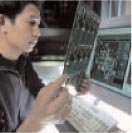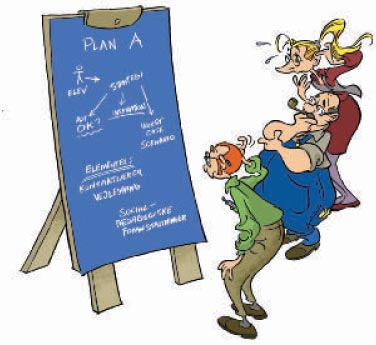|
|

7 Institutional strategies
School management is increasingly considering drop-outs and retention as a complex strategic quality issue that therefore must also involve other actors. Professionalism and student well-being are the main focus points. In recognition of an increasing heterogeneity in the student profile, schools are treading new pathways in order to professionalize efforts targeting individual students before they start the basic programme. School management has been gathering inspiration from afar and forming new collaborative relationships, in order to better systemically address youth needs and youth cultures. Institutional strategies are supported by quality objectives and the active use of statistics. Entrance interviewCustomer service centre Schools are receiving a growing number of students who are unfocused and who have a broadening range of personal and social problems. Faced with this, EUC Vest has reorganized school entry procedures and counselling functions into a single unit called the “Customer Service Centre.” Students take part in introductory entrance consultations before they start their basic programmes, so that the school can evaluate any potential needs for special support efforts. This enables vocational teachers to support students' professional progress and development from the very start, and students with special needs can receive targeted and individualized support to better prepare them for their educational pathway. EUC Vest has allocated extra resources for retention efforts; experienced teachers who have a good grip on the students are used to monitor those who do not keep up with their schoolwork. Ongoing quality developmentInvolvement of vocational colleges' stakeholders
School management at CEU Kolding (Centre for Business and Training in Kolding) has formulated a vision of “Guaranteed Apprenticeships for All.” The vision is based on the school's quality development activities.[10] The school's goal with this vision is to signal the development of an institutional student retention policy that focuses on increasing the school's attractiveness to external stakeholders. A collaborative development programme involving the school's board of directors, middle management, and teachers, is in the process of being launched. This project, whose focal point is the learning team, combines pedagogical development with organizational development. Students are invited before programme start-up to an introductory consultation which focuses on the realism of the student's own considerations and choices. The learning team involves the student, the student's teachers, the student's parents if the student is a minor, and an enterprise - whether or not the student already has an apprenticeship agreement. Later on in the educational programme, apprenticeship enterprises present students with projects related to real enterprise problems, and students must in turn present their solutions and how they arrived at them. A panel questions the individual student about his or her presentation, and gives the student feedback. All this will make new demands on school-enterprise collaboration, but will also give enterprises a more active and influential role in the school-based portion of the programme. Focus on students with difficultiesNetwork collaboration Many students have severe personal and social problems; for a growing number, it is these problems, rather than learning problems, that lead to dropping out. CEUS has improved its efforts to target this group by using what can be characterized as a round-the-clock collaborative effort by the municipality, the prison and probation service, and SSP (school-social services-police network). Schools feel that when dealing with the most marginalized group of youth, the refinement of existing tools is simply not enough; a more radical approach is required. Targeted counselling of refugees and immigrants Over the years, CEUS has built up a varied bank of knowledge about refugees and immigrants. Differentiated counselling based on knowledge of individual cultures is a key to success. The many Bosnian refugees at the school usually come from families or localities with predominantly craftsmanship backgrounds. This gives them the ballast to make it through the Crafts and Engineering entryway. On the other hand, Somalian refugees' backgrounds give them better prerequisites for entering Commerce or Social Services and Health entryways. Hire a "streetwalker" As a consequence of changing student profiles, the management at EUC Syd has hired a “streetwalker”. This model is taken from social work environments, where a person with social work experience undertakes outreach work in troubled sections of inner cities. The streetwalker's presence on the street and active intervention can head off confrontation and unrest in the city. The streetwalker at EUC Syd is similarly a social worker, with the same functions within the school environment. Use of statistics and indicatorsKey data as indicators of problem areas Several vocational colleges systematically use statistics as a tool to follow-up on students. As part of its quality development, EUC Vest has begun improving its overall data basis so as to promote easier access. In the future, the school administration will produce and process all relevant statistical and economic data for the school. Key data for chosen indicators will be presented like traffic lights, with green as a positive indicator and red as a signal for immediate action. The school is in the process of identifying relevant indicators. Identification of drop-out patterns In order to improve retention efforts, Aarhus Technical College is focusing on statistics as a means of identifying reasons for drop-outs. Students are administratively registered as drop-outs when they no longer show up at school and the school is unable to get hold of them at the address or mobile phone number that is on record. Getting these students back on track requires close collaboration with the Youth Education Counselling Centres. Aarhus Technical College uses comprehensive data analysis in order to develop future pedagogical praxis. Data analysis has, for example, shown that students who have changed study programmes multiple times are at very great risk of dropping out. If these students are identified early, the school is able to take pro-active measures. Further development of Elevplan Aalborg Technical College has established a cross-entryway task force for the further development of Elevplan so that it better supports contact teachers' and the individual students' overview of education programme elements such as scheduling, module content and projects, and absenteeism frequency and pattern. Observations
Foot note 10) CEU Kolding's quality development is inspired by similar community college work on Long Island, N.Y.
|
||
|
To top of page |
